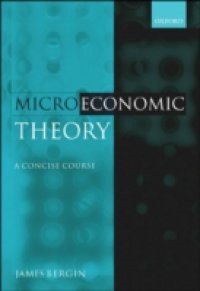Microeconomic Theory is based on lecture notes for a graduate course in microeconomic theory. It covers a broad range of topics, and to some extent the lecture structure is retained in the style of the book. The author provides a clear account of the main ideas in each area concisely, and in some depth of detail. The presentation is at an advanced level and provides succinct coverage of the material in a self contained discussion. Chapters are organized and written independently making it possible to read any chapter without having read earlier material. Each chaper is written on the presumption that the reader has some familiarity with the topics or issues under discussion but would value further discussion, or a second point of view . While much of the material is mainstream, a substantial portion is not available in existing textbooks. The book covers a range of topics appearing in advanced courses inmicroeconomic theory. Coverage includes such topics as decision theory, strategic and extensive form games, auctions, bargaining, information models, principal- agent problems, signalling and screening games, cooperative games and models of learning.

